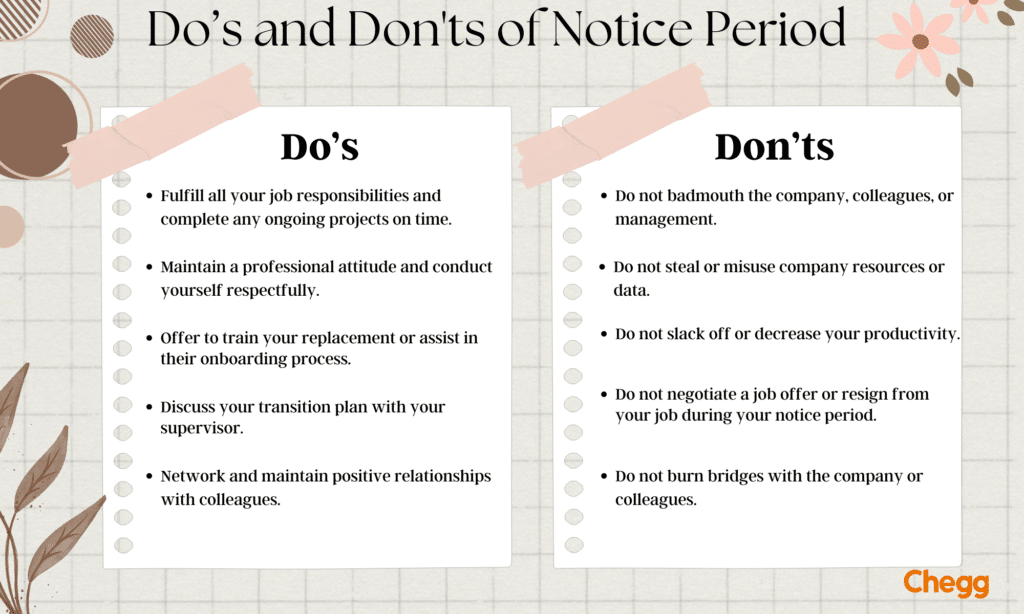

Quick Summary
- The notice period is the duration an employee serves after resigning before leaving their current job, highlighting its significance in the employment contract.
- Companies mandate notice periods to ensure a smooth transition, completing pending tasks, finding replacements, and maintaining business continuity.
- Some common errors professionals make during their notice period, such as neglecting their duties, burning bridges, sharing sensitive information, engaging in negative behaviour, or failing to prepare for the transition.
- Leaving a positive impression during the notice period is crucial to maintaining professionalism. Completing tasks diligently, training replacements, and expressing gratitude to colleagues and employers will open communication windows.
Table of Contents
People seldom stick to one job throughout their careers. Moving on to better opportunities and roles is very common. Have you received a better job offer and planning to move on? Submitting your resignation letter and serving a notice period is your next big step.
Maintaining a cordial relationship with your current employer and co-workers is very important. To do so, you must tie loose ends and organize your tasks perfectly. It is crucial to meet the expectations of your current employer before your departure.
This article discusses what serving a notice period means and what to do during the notice period.
What is a Notice Period?
The notice period is the duration from submitting your resignation until your exit from the company. Your notice period starts on the day when you put in your papers. It goes on until your last working day. Serving a notice period is essential for the employer to prepare sufficiently for your departure.
Why do Companies Require a Notice Period?
Both you and your current employer will benefit from this notice period. Let us discuss these benefits that will give you a perfect picture of their significance.
Benefits for Employers
It is your ethical duty to serve a notice period to give time for your employer to find your replacement. Serving a notice period will also allow a smooth transition by hiring and training new members. All the knowledge transfer happens during this time.
Your employer will also use this time to complete all the administrative and financial requirements of the firm.
Benefits for the Employees
You can leave your firm on a positive note, maintaining positive relationships with everyone. By doing so, you are being respectful and courteous to your employer. It is also imperative that you leave your workplace on a good note. You will benefit from positive feedback and references wherever you go.
Mistakes People Make When Serving Notice Period
Now that you have understood the significance of the notice period let us discuss the top 10 mistakes to avoid. This will help you leave your workplace on good terms with your employer. You will also get to know how to serve the notice period.

Here are the top 10 mistakes that should be avoided when you put in your papers:
1. Not Providing Sufficient Notice
Do not make the mistake of taking your employer for granted and not providing sufficient notice period. Based on company policies, you are legally bound to serve the pre-accepted notice period.
If you do not give enough notice, you can face legal consequences. Also, you will spoil your reputation with your current firm and cannot expect good references.
2. Failing to Clarify Your Obligations
Make sure to discuss and clarify your contractual obligations to the company. Talk to your boss about the formalities you must complete before the last working day. Ensure that you are on the same page as your employer to get a clear picture of what is expected from you.
3. Not Following Proper Protocol
When you submit your resignation, know your contract inside out. Follow proper protocols to the T to make your change more manageable. Take your time to understand all the post-termination protocols for a smooth process.
4. Neglecting Your Work Responsibilities
The notice period is not a vacation! Be very productive and responsibly complete all your assignments on time. If that is not practically possible, use this time to train your team. Neglecting your responsibilities and being inefficient is very unethical and unprofessional.
5. Not Leaving on Good Terms
You might not have positive thoughts and opinions on all the aspects of your employer. However, do not leave on a sour note. Keep things positive during your exit interview.
Send a proper goodbye mail to everyone and keep your professional contacts updated. Negative things will not only spoil your relationships but also spread in the marketplace. This might affect your future success prospects.
6. Burning Bridges
Do not burn all the bridges on your way out. You might want to return someday! Keep all the communication paths open and welcoming. Maintain amicable relationships with your boss, co-workers, HR, and others. Respect them and say proper goodbyes.
7. Refusing to Train Your Replacement
You are ethically obligated to train your replacement on the job’s responsibilities. If you are reluctant to train your replacement, you will tarnish your image with the firm. Introduce your replacement to your team, clients, and vendors.
Share all the contact information and the technicalities of the job. Make sure the knowledge transfer is smoother. Do the transition planning in advance and update your boss about the developments.
8. Not Completing Your Assigned Work
You might have been working on a few critical projects at the time of your resignation. Put sincere efforts into completing your work at top quality by the deadline. If the length of the project is too long, then make sure to train your replacement accordingly.
9. Sharing Confidential Information
Do not carry or share confidential information with others. This is regarded as stealing, so hand over all the documents properly. Submit devices, emails, passwords, and confidential documents to the concerned person. Also, delete all work-related data from your phone and other personal devices before your departure.
10. Not Being Open to Feedback
Most firms conduct exit interviews. Be open to feedback and criticism during your exit interview. Accept constructive feedback as a developmental tool and prepare for your next opportunity. Not being open to feedback during your notice period will not serve you or your employer well.

Also Read: Relieving Letter Format – Uses & Samples
How to Negotiate for a Lesser Notice Period?
While serving a notice period is extremely important, negotiating a workable period is crucial. You can follow these actionable steps to negotiate your notice period efficiently.
Communicate your Expectations
During your resignation, clearly state your expected relieving date. By doing so, you can request your boss to expedite the process if needed. This will be especially helpful if you want to cut short your notice period based on your employment contract.
Establish a Genuine Connection with the Management
Maintaining a good relationship with your management and co-workers is essential. Explain to them why this change is crucial for you. You can also help them find and train your replacement. By doing so, your superior will be happy to help you shorten your notice period.
Buy Out
Buying out is another popular option to shorten your notice period. You can try this if you have agreed to a very long notice period in your employment contract. Under this, you can negotiate an agreement with your employer to pay money in exchange for an early relieving date.
Be Proactive
Understand the requirements of your employer and take a proactive approach. Every firm has company policies when it comes to serving notice periods. Help in finding a replacement and make the handover process seamless. This way, you maintain a win-win situation with your employer.
Related Read: Profession Email Writing – Email Format, Samples & Tips
Leaving With a Good Impression
Serving a notice period is indispensable for anyone leaving their company for any reason. Even if you leave voluntarily or are being terminated, you must serve your notice period. Use this period to showcase your professionalism and complete your duties promptly.
Serving your notice period with the same level of commitment will help you maintain your relationships. Doing so will keep the communication windows open!
Evaluate numerous career choices to choose the right career path for yourself. Dive into our guide on Career Advice.
Frequently Asked Questions
What is a notice period?
A notice period is the duration from the day you submit your resignation until your last working day in any organization. Every employee wanting to resign from their current job has to serve their notice period. This is mandatory irrespective of your reason for leaving the organization.
How long is a typical notice period?
A typical notice period can last anywhere from 2 to 4 weeks. It varies based on your position and what you have agreed upon in your employment contract.
Why do companies require a notice period?
Companies require this notice period to hire a replacement and train the new person. You will also be expected to hand over all the data and information to the concerned person during this period. The firm will also handle all the administrative and financial aspects.
What is the purpose of giving a notice period?
In case of voluntary resignation, you are serving a notice period to help the firm find and train a replacement. But if you are terminated, the companies offer this notice period as breathing time. You can do your job search during the notice period.
What should be included in a resignation letter?
Your resignation letter should include your statement of resignation and your last working date. You can also include your gratitude for the company and your contact information. Also, state your willingness to train your replacement if needed.
To read more related articles, click here.
Got a question on this topic?